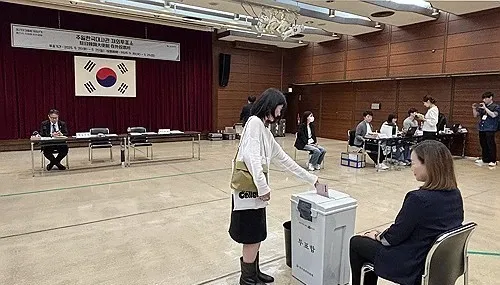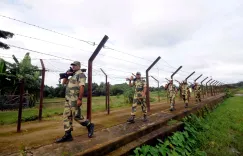Is Overseas Voting for the South Korean Presidential Election in Full Swing?

Synopsis
Key Takeaways
- Over 258,000 South Koreans eligible for overseas voting.
- Polling stations established in 118 countries globally.
- Significant voter turnout expected in key locations like Tokyo and Beijing.
- Major candidates aiming for votes from the greater Seoul area.
- Engagement of expatriates is crucial for the democratic process.
Tokyo/Beijing, May 20 (NationPress) Nationals of South Korea residing or visiting abroad cast their votes on Tuesday as the overseas voting process commenced ahead of the impending June 3 election, as confirmed by embassy representatives.
The voting period for those outside the country will last for six days, allowing over 258,000 South Korean citizens, including absentee voters, the opportunity to participate at 223 polling locations spread across 118 nations.
In Japan, approximately 38,000 out of 411,000 eligible South Korean voters aged 18 and above registered to vote, as stated by the South Korean Embassy in Tokyo.
Polling stations were established in Tokyo and several major cities, including Yokohama, Osaka, Kobe, Sapporo, Sendai, and Fukuoka.
Among those who voted earlier in the day was Park Cheol-hee, South Korea's ambassador to Japan. He remarked, "It's crucial for overseas Koreans to fulfill their voting rights for the advancement of Korea." He urged as many individuals as possible to visit polling stations, even amid busy schedules.
In China, ten polling stations were created, including locations at the South Korean Embassy in Beijing and consulates in Guangzhou, Shanghai, Shenyang, Xian, Wuhan, Chengdu, Qingdao, and Hong Kong, as well as a consular office in Dalian.
Of the 4,218 registered voters, 250 citizens participated in the voting process during the day, according to an embassy official in Beijing.
The first voter came from a university in New Zealand, reported the South Korean Embassy in Wellington, as noted by Yonhap news agency.
As the election approaches, the Democratic Party (DP) candidate Lee Jae-myung and the People Power Party (PPP) candidate Kim Moon-soo are conducting campaign rallies in the greater Seoul area, aiming to engage centrist voters.
With only two weeks remaining until the June 3 presidential election, Lee plans to tour Gyeonggi Province, while Kim will focus on Seoul.
The greater Seoul area is significant, housing about half of South Korea's 52 million residents, making it a pivotal location in the race to succeed former President Yoon Suk Yeol, who was removed due to a failed martial law attempt.
Recent opinion polls indicate that Lee is leading Kim, with a Realmeter survey from this week showing Lee at 50.2% support, followed by Kim at 35.6% and Lee Jun-seok from the New Reform Party at 8.7%.
Lee of the DP will start the day by hosting virtual discussions with Korean expatriates to motivate overseas voting, which is taking place for a week starting Tuesday.






